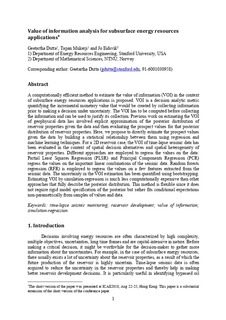Value of information analysis for subsurface energy resources applications
Journal article, Peer reviewed
Accepted version

View/
Date
2019Metadata
Show full item recordCollections
- Institutt for matematiske fag [2351]
- Publikasjoner fra CRIStin - NTNU [37219]
Abstract
A computationally efficient method to estimate the value of information in the context of subsurface energy resources applications is proposed. The value of information is a decision analytic metric quantifying the incremental monetary value that would be created by collecting information prior to making a decision under uncertainty. It has to be computed before collecting the information and can be used to justify its collection. Previous work on estimating the value of information of geophysical data has involved explicit approximation of the posterior distribution of reservoir properties given the data and then evaluating the prospect values for that posterior distribution of reservoir properties. Here, we propose to directly estimate the prospect values given the data by building a statistical relationship between them using regression and machine learning techniques. For a 2D reservoir case, the value of information of time-lapse seismic data has been evaluated in the context of spatial decision alternatives and spatial heterogeneity of reservoir properties. Different approaches are employed to regress the values on the data: Partial Least Squares Regression and Principal Components Regression regress the values on the important linear combinations of the seismic data. Random Forests Regression is employed to regress the values on a few features extracted from the seismic data. The uncertainty in the estimation of the value of information has been quantified using bootstrapping. Estimating the value of information by simulation-regression is much less computationally expensive than other approaches that fully describe the posterior distribution.
